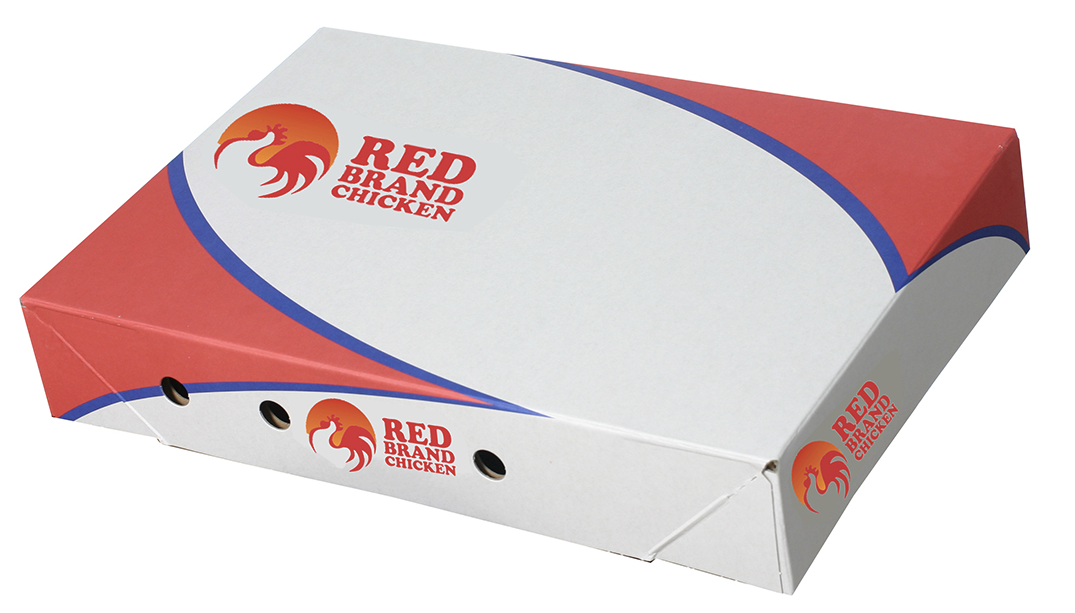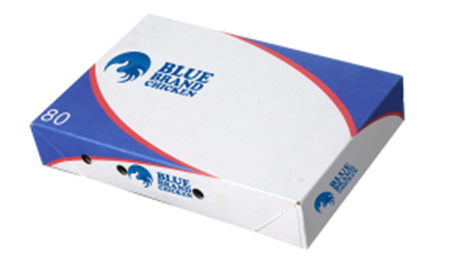When is it appropriate to declare bad faith? A case study from the poultry market in Poland
On September 6, 2023, the EU General Court ruled in Case T-312/22 concerning the RED BRAND CHICKEN trademark (EUTM 13 068 861) and invalidated EUIPO’s decision that the below-presented EUTM 13 068 861 trademark was registered in bad faith.
The parties in dispute included D&J FOOD (the plaintiffs and holders of the rights to the aforementioned mark) and Grzegorz Wyrębski (the intervener) who claimed that the mark was filed in bad faith.
On July 9, 2014, the plaintiffs applied for registration of the RED BRAND CHICKEN three-dimensional mark in classes 29 and 40. The mark was registered. On February 15, 2018, Grzegorz Wyrębski filed a motion for cancellation of the right to the above-mentioned trademark and cited Article 52(1)(b) of Regulation (EC) No. 207/2009 (now Article 59(1)(b) of Regulation (EU) 2017/1001), i.e. the applicant acting in bad faith at the time of filing the trademark application.
On April 16, 2020, the Cancellation Division granted the motion and cancelled the trademark right, following which the plaintiffs appealed the aforementioned decision to the EUIPO. However, the Office’s Second Board of Appeal dismissed the appeal filed by the above-mentioned entities.
In the Board’s opinion:
- between 2012 and 2014, Grzegorz Wyrębski and the plaintiffs were bound in cooperation in the area of producing and selling frozen chicken fillets;
- since 2013, Grzegorz Wyrębski used an identical sign to sell the same goods in Ireland, of which the other party was aware when applying for trademark protection;
- the parties were the partners of equal standing in a joint commercial venture, which entailed a fiduciary duty and a duty of loyalty;
- the applicants had tried to prevent the intervener from using the disputed mark since 2014; and
- the Cancellation Division correctly concluded that the applicants acted in bad faith when applying for protection for the disputed mark.
The cooperation of the parties was initiated by one of the plaintiffs. Having the know-how, he proposed to the intervenor, who had the production capacity, the business idea of producing and selling injection marinated chicken fillets. However, the parties to the dispute viewed this cooperation differently.
According to the plaintiffs, the EUIPO Board of Appeals mischaracterized the relationship they had with the intervener. According to them, Grzegorz Wyrębski was only the manufacturer of the goods which he branded with the plaintiffs’ logo and label, and he did not participate in the designing of the disputed mark. Moreover, they were the only ones who used the mark designer’s services for a fee. They also claimed that by filing the aforementioned mark they did not want to harm the intervener because, firstly, he was not their competitor, and secondly, he was not a person jointly entitled to the disputed mark.
Grzegorz Wyrębski argued that the trademark application should have been made by mutual consent of the parties. Moreover, Grzegorz Wyrębski did not consider himself to be only a producer of the plaintiffs’ goods on commission, but also a participant in the joint venture operations, namely, the manufacture of injection-marinated frozen chicken fillets. He claimed to have invested his own funds in the cooperation by, among other things, purchasing machinery, which he tried to prove by presenting invoices. He believed that he had equal rights to use the RED BRAND CHICKEN trademark as he claimed that he participated in the creation of the mark in question.
The Board of Appeals shared the intervener’s position on the issue of the parties’ cooperation and found that the plaintiffs’ role in their relations with Grzegorz Wyrębski reached beyond that of an agent. Moreover, the relationship went beyond a production contract since, firstly, the intervener invested funds in the goods production and, secondly, he was to some extent involved in the creation of the disputed mark. The Board also emphasized that as partners in a joint venture not based on a written contract, the parties had had certain obligations to each other – including the obligation to share the right to use the EUTM 13 068 861 mark.
The CJEU assessed the Parties’ evidence differently and declared the decision to cancel the disputed mark invalid.
The Court concluded that:
- no agency agreement was signed between the parties and none of them can be considered an agent, and the fact that the relationship between the parties went beyond the aforementioned agreements is insufficient to establish the existence of a business relationship in which the parties would have equal standing as partners in a joint venture not based on a written contract;
- the participation of Grzegorz Wyrębski in the costs of creating the disputed sign was not evidenced since he did not present, without limitation, his correspondence with the individual developing the mark;
- the machinery purchased by the intervenor was not intended solely for the purpose of working with the plaintiffs, but also for completing orders placed by other companies;
- the expenses incurred when installing the machinery purchased by the intervener do not prove the existence of a commercial relationship or the equal standing of the partners to a potential venture;
- the EUIPO and the intervener did not provide a legal basis to qualify the commercial relationship between the parties and determine their mutual rights and obligations and, furthermore, to establish the existence of the aforementioned „joint venture not based on a written contract”, which would entail the obligation to equitably share the right to use the disputed trademark; and
- the Board of Appeals erred when finding that the plaintiffs had acted in bad faith.
Simultaneously, another case was pending before the EUIPO between the parties in question, i.e. case T-316/22 concerning the BLUE BRAND CHICKEN (EUTM 13071378) three-dimensional EU trademark, which the intervener also sought to invalidate. After the parties presented the same claims as above, the CJEU also in this case declared the decision of the EUIPO Board of Appeals to be invalid.
Summary
The CJEU ruling should be considered as correct. The belief of one party to a cooperation that the venture is a joint one is not sufficient to claim rights to the mark. The evidence submitted by the parties in this regard in a case for trademark cancellation on the grounds of bad faith must be subject to careful examination by the registration authority and the court.
See more:
Review of CJEU case law from 2.02.2026 to 6.02.2026
Judgment of 5 February 2026, EUIPO v Nowhere Co. Ltd, Case C‑337/22 P – The case concerned opposition proceedings relating to the application for registration of the EU figurative trade mark APE TEES: – On 30 June 2015, Mr Ye filed an application for an EU trade...
Review of CJEU case law from 26.01.2026 to 30.01.2026
Judgment – of 28 January 2026 – Montepelayo, SLU v. EUIPO, Case T-203/25– The case concerned opposition proceedings against the registration of an EU word mark. – Montepelayo, SLU filed an EU word mark application for TELOTRÓN for goods and services in Classes 5...
Review of CJEU case law from 19.01.2026 to 23.01.2026
Hesse v EUIPO – 19.01.2026 – Ferrari (TESTAROSSA), Case C‑597/25 P– The case concerned the procedure under Article 58a of the Statute of the Court of Justice for determining whether an appeal against a judgment of the General Court in EU trade mark proceedings should...


